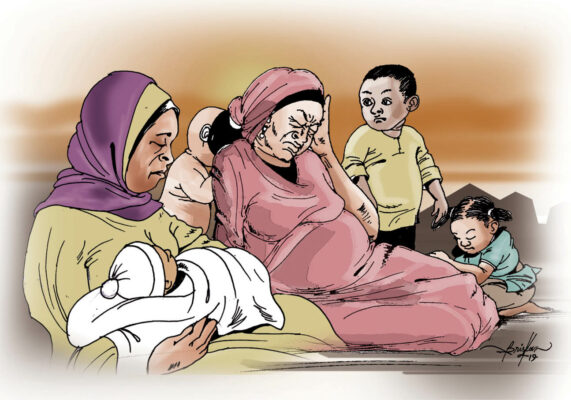On the morning of July 14, 2025, police officers stormed a baby factory in a remote village on the Enugu-Anambra border, where they rescued a seven-month-old baby and two pregnant women held captive.
The police rounded up eight suspects, comprising women in their twenties and fifties, on charges of child theft and unlicensed medical practices, as well as running a criminal enterprise.
Yet this was only one of a series of crackdowns declared by the Nigeria Police Force since this week.
Elsewhere, in Ondo State, police rescued a Ghanaian national and 39 others that had been trafficked under false promises of jobs abroad.
Baby factories cut deep into Nigerian society, revealing a secret network of crime and exploitation. Poor, uneducated women are recruited or coerced to bear children that eventually become commodities on the black market.
In a 2018 raid that went viral for its significance, Nigerian security operatives liberated more than 160 babies trapped in unauthorised Abuja orphanages.
The operation revealed how sophisticated trafficking rings had become in the country. Often disguised as legitimate facilities like private hospitals, orphanages, or welfare homes, these dens are deeply entwined with Nigeria’s broader human trafficking economy.
Baby factories have continued to flourish in the country notwithstanding, becoming one of Nigeria’s most lucrative underground markets.
As far back as 2006, a UNESCO report identified child trafficking as Nigeria’s third most prevalent crime, following drug trafficking and financial fraud.
In Nigeria, baby factories fueled by numerous factors, not least of which is social stigma. Teenagers facing unwanted pregnancies often fall prey to promises of help, only to be persuaded or forced to give up their babies for money.
At the same time, intense cultural pressure surrounding infertility drives many couples to seek children discreetly, avoiding formal adoption or surrogacy due to the shame such routes might attract. These dynamics create a fertile environment for traffickers who exploit both the vulnerable and those desperate to become parents.
Hard figures on Nigeria’s baby factories remain elusive, partly because many cases go unreported. However, a 2021 report by United Nations Office on Drugs and Crime reported that over 75% of people trafficked in West Africa are children.
Babies can fetch anywhere from ₦1 million to ₦2 million depending on gender and health, while pregnant women are sometimes offered as little as ₦100,000 for relinquishing their newborns, a fraction of what traffickers earn.
Beyond baby factories, Nigeria ranks as both a source and destination for human trafficking. According to the 2023 U.S. Trafficking in Persons Report, Nigeria remains on the Tier 2 Watch List due to significant trafficking challenges.
Over 1,200 trafficking victims were rescued in 2023 alone, but prosecutions remain low, and conviction rates often collapse under weak investigations or witness intimidation.
Nigeria is not alone. In neighbouring Ghana, authorities in 2023 uncovered 109 trafficking cases. Benin and Togo have struggled with similar rings linked to cross-border child trafficking for forced labour or sexual exploitation.
However, some regional interventions have shown promise. Ghana, for instance, introduced stringent monitoring of private maternity and childcare homes, cutting off a significant pipeline for illegal adoptions. Joint task forces between Nigeria, Ghana, and INTERPOL have yielded occasional breakthroughs, like the Ondo operation that rescued the Ghanaians but these efforts are still sporadic and often underfunded.
Within Nigeria, states like Lagos and Ogun have in recent years intensified surveillance of private clinics and maternity homes, resulting in several high-profile closures. Yet traffickers simply migrate to states with weaker oversight, revealing a cat-and-mouse dynamic that national policy has yet to overcome.
The human toll of baby factories is devastating. Women endure trauma, sexual violence, and lifelong stigma. Children sold through illegal channels often grow up without birth certificates, denied basic rights to education, inheritance, or identity.
Moreover, baby factories feed into broader trafficking networks. Children can be trafficked into forced labour, sexual exploitation, or organ harvesting. Some are smuggled across borders under false identities, their fates lost in bureaucratic oblivion.
Several factors allow baby factories to endure. Poverty and unemployment create a steady supply of vulnerable women and desperate buyers. Social stigma around infertility pushes couples to seek children outside legal channels.
Corruption and weak enforcement mean traffickers often evade punishment, while inadequate regulation of maternity and childcare facilities lets illegal operations hide in plain sight.
Yet some solutions have worked in the past. Public education campaigns in Lagos and Ogun reduced community tolerance for hidden maternity homes, leading communities to tip off authorities rather than shielding traffickers.
Collaboration with faith groups and community leaders has helped break cultural taboos, particularly around adoption, while victim rehabilitation and reintegration efforts by NGOs such as Women’s Aid Collective (WACOL) in Enugu provide shelter, counselling, and vocational training to rescued women, helping them rebuild their lives.
Cross-border cooperation remains essential. Many baby factories operate as nodes in larger trafficking networks moving people across West Africa.
The recent busts in the Southeast and Ondo are victories, but they don’t signal the end of the war. Without stronger social welfare systems, better law enforcement, and a shift in cultural perceptions of adoption and women’s reproductive rights, baby factories will continue to spring up in new places, hidden behind locked doors.
Recent police operations across Nigeria have targeted the troubling phenomenon of "baby factories"—facilities where women are coerced into bearing children for illegal adoption and trafficking. These crackdowns have led to the rescue of multiple victims, including a 7-month-old baby and two pregnant women, along with the arrest of numerous suspects at a location along the Enugu-Anambra border. This reflects a broader effort by Nigerian authorities, who have been addressing human trafficking, with reports such as a significant operation in Abuja in 2018 freeing over 160 babies from unauthorized orphanages.
Baby factories are deeply entrenched in Nigerian society, driven by factors like poverty, infertility stigma, and a lack of regulation, making it a lucrative underground market. Victims include poor, uneducated women and desperate couples seeking children outside legal adoption avenues. The United Nations Office on Drugs and Crime reported in 2021 that over 75% of trafficked individuals in West Africa are children, highlighting the scale of the issue.
Despite ongoing efforts, including collaborations between countries like Nigeria, Ghana, and international bodies like INTERPOL, the issue persists due to systemic challenges such as corruption, weak enforcement, and societal stigma. Public education campaigns and community involvement show some promise in combating these operations. However, without broader changes in social welfare, cultural attitudes towards infertility and adoption, and strengthened law enforcement, baby factories may continue to thrive.






